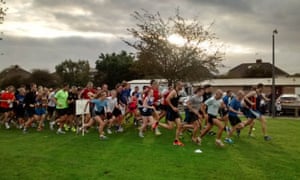The news that Stoke Gifford parish council has become the first to vote to charge those who take part in the local Little Stoke parkrun event is bad for everyone. Not just bad for those who take part in the event near Bristol, which organisers say will be cancelled as soon as the charge is implemented, but also for the wider community, both locals and runners. My fear is that, now a precedent has been set, other councils will attempt to follow suit. This could mean the end of parkrun, at least in its current form, and that is bad news for our physical and mental health.
Parkrun was established in 2004 in Teddington, south-west London, as a free, timed 5k run. There are now 850 parkruns worldwide in 12 different countries. Parkrun does not charge those who wish to take part, and states that free access is “fundamental” to encourage the least active members of society to start exercising regularly. You register on its website, print off a unique barcode and then simply turn up on a Saturday at 9am.

Much has been made of the fact parkrun has paid members of staff, and that therefore it can well afford to pay councils for the upkeep of parks and paths that their runners use. This is disingenuous. There are only a small number of staff, with sponsorship forming a key part of how parkrun survives. Each local event is manned by volunteers who give up their time for nothing in order to help encourage others. This is part of it’s very appeal: you feel part of a group, and the camaraderie is great: you’re all there because you want to be, not because you have paid to go.
I started volunteering at my local parkrun last autumn. As a volunteer, you take on a variety of roles, from timekeeping to marshalling, collecting finish tokens to setting out and collecting route markers. My favourite role is that of tail runner – keeping at the back of the run, so that everyone knows when all runners have finished, and ensuring that nobody is ever left behind. This role has been an eye-opener to me, as it clearly shows what a wide variety of people take part in parkrun. Yes, you always get the speedy ones at the front, treating it as a competition; but parkrun is not a race but a timed run. This means that literally anyone can take part, from children to those who walk the entire 5k route. And this is absolutely fine. Even the slowest participant knows that they will not be hurried to the finish, or mocked for failing to break into a run. Seeing the improvements in these participants, and the smiles on their faces when they are able to start running a section of the course, or when they achieve a personal best (and get to ring the parkrun bell!) is worth far more than money.
Prices for competitive running events have rocketed since I started taking part some 20 years ago. My local 10k race now costs £25 to enter; the half-marathon I recently entered is nearer £40. If you want the goal of a race to keep you training, or to motivate you, it costs money – but parkrun is open to everyone regardless of ability or income, and it should be encouraged rather than shut down.
The council says it is unfair to expect non-runners to pay for path upkeep, and this therefore justifies the imposition of a fee. However, parkrunners are always told to take care of the land we run on. At my local event, we stick to paths that are widely used anyway. Many run locally outside of parkrun – although they may not all be in the same park at the same time, they are still pounding those same paths – yet they are not being asked to pay at any other time. This is even before the argument is made that the majority of participants are taxpayers and therefore contribute to this upkeep anyway. Parkrunners may also contribute money to council coffers by paying to park at council car parks before the run, and we also spend money in local cafes afterwards, thereby contributing to the local economy.
My local parkrun never exceeds 200 people. It takes place once a week, early on a Saturday, when the local area is very quiet – we are packed up and gone before the town fills and people want to use the car parks or the paths. Parkrun also encourages people to keep fit, to socialise, and to get out in the open air, thus having both physical and mental health benefits. It is emphatically not about money – and I hope that the decision of one parish council does not make it so.
Source: Read Full Article
